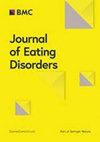针对进食障碍患者的认知矫正疗法:一项定性研究
IF 3.5
3区 医学
Q2 NUTRITION & DIETETICS
引用次数: 0
摘要
跨诊断认知矫正治疗(Transdiagnostic Cognitive Remediation Therapy,TCRT)是针对饮食失调症(EDs)的认知矫正治疗的一种新的调整方法,旨在解决ED诊断中常见的认知困难(即认知灵活性、中枢连贯性和冲动性)。这是对这种新型疗法的首次评估。本研究旨在探讨 TCRT 的可接受性和患者的体验。13 名被诊断为限制型或暴饮暴食亚型 ED 并同时伴有认知障碍的患者在接受 TCRT 治疗后完成了半结构化定性访谈。访谈记录采用反思性主题分析法进行分析。分析得出四大主题:(1) 治疗适应性 (2)、治疗体验 (3)、感知结果 (4) 未来建议。13 名患者中有 11 人对治疗给予了积极评价,认为治疗重点具有相关性,并表达了治疗如何有助于获得与思维方式相关的新见解。其中七名患者还将其描述为做出改变和使用新策略的起点。重要的是,经历一些与治疗中解决的认知困难相关的挑战似乎对参与治疗至关重要。将 TCRT 作为一种辅助治疗方法提供给伴有认知障碍的 ED 患者,可以让患者参与治疗,建立治疗联盟,并提供重要的认知和策略来应对与思维方式相关的挑战。本研究是一项大型随机对照试验的一部分,ClinicalTrials.gov Id:NCT03808467。认知障碍被认为是导致进食障碍(ED)发生和维持的几个因素之一,但在ED治疗中却很少涉及。针对进食障碍的认知矫正治疗(CRT)最初是针对神经性厌食症(AN)患者开发的一种专门针对认知障碍的辅助治疗方法。然而,认知障碍不仅存在于神经性厌食症患者中,也存在于各种诊断的 ED 患者中。在本研究中,我们对 CRT 进行了调整,以解决各种 ED 诊断中的认知障碍。本研究的目的是探索患者对这种新型跨诊断 CRT 的体验。我们在 13 名患有各种进食障碍的患者接受治疗后对他们进行了访谈。其中 11 名参与者对治疗给予了积极的评价,表示治疗很吸引人,提供了一些新的东西,让他们更加了解自己的思维过程。七名参与者还表示使用了新的策略来应对与认知困难有关的挑战。重要的是,有一名参与者表示她没有遇到认知困难,并选择退出治疗,这突出了找到与促进参与相关的治疗方法的重要性。本文章由计算机程序翻译,如有差异,请以英文原文为准。
Cognitive remediation therapy for patients with eating disorders: a qualitative study
Transdiagnostic Cognitive Remediation Therapy (TCRT) is a new adaptation of cognitive remediation therapy for eating disorders (EDs) developed to address common cognitive difficulties across ED diagnoses (i.e., cognitive flexibility, central coherence, and impulsivity). This is the first evaluation of this novel treatment. The aim of this study was to explore acceptability and patients’ experience of TCRT. Thirteen patients diagnosed with restrictive or binge/purge subtypes of EDs and concurrent cognitive difficulties completed semi-structured qualitative interviews after receiving TCRT. Interview transcripts were analyzed using reflexive thematic analysis. The analysis resulted in four main themes: (1) Treatment fit (2), Treatment experience (3), Perceived outcomes, and (4) Future recommendations. Eleven of the thirteen patients evaluated the treatment positively, found the focus relevant and expressed how it contributed to new insights related to thinking style. Seven of the patients also described it as a starting point for making changes and using new strategies. Importantly, experiencing some challenges related to the cognitive difficulties addressed in the treatment seemed essential for engagement. Offering TCRT as an adjunctive treatment for patients with EDs and concurrent cognitive difficulties can be a way to engage patients in treatment, build therapeutic alliances and provide important awareness and strategies to handle challenges related to thinking style. This study is part of a larger randomized controlled trial, ClinicalTrials.gov Id: NCT03808467. Cognitive difficulties are thought to be one of several factors contributing to the development and maintenance of eating disorders (ED), but are rarely addressed in ED treatments. Cognitive remediation therapy (CRT) for EDs is a supplementary treatment originally developed for patients with anorexia nervosa (AN) that specifically targets cognitive difficulties. However, cognitive difficulties are found across ED diagnoses and not only in patients with AN. In this study, we have adapted CRT to address cognitive difficulties across ED diagnoses. The goal of this study was to explore patients’ experiences of this novel transdiagnostic CRT. We interviewed 13 individuals with various eating disorders after they had received the treatment. Eleven of the participants rated the treatment positively, expressed that it was engaging, offered something new and made them more aware of their thought processes. Seven participants also reported using new strategies to handle challenges related to cognitive difficulties. Importantly, one participant expressed that she did not experience cognitive difficulties and chose to drop out of the treatment, highlighting the importance of finding the treatment relevant to foster engagement.
求助全文
通过发布文献求助,成功后即可免费获取论文全文。
去求助
来源期刊

Journal of Eating Disorders
Neuroscience-Behavioral Neuroscience
CiteScore
5.30
自引率
17.10%
发文量
161
审稿时长
16 weeks
期刊介绍:
Journal of Eating Disorders is the first open access, peer-reviewed journal publishing leading research in the science and clinical practice of eating disorders. It disseminates research that provides answers to the important issues and key challenges in the field of eating disorders and to facilitate translation of evidence into practice.
The journal publishes research on all aspects of eating disorders namely their epidemiology, nature, determinants, neurobiology, prevention, treatment and outcomes. The scope includes, but is not limited to anorexia nervosa, bulimia nervosa, binge eating disorder and other eating disorders. Related areas such as important co-morbidities, obesity, body image, appetite, food and eating are also included. Articles about research methodology and assessment are welcomed where they advance the field of eating disorders.
 求助内容:
求助内容: 应助结果提醒方式:
应助结果提醒方式:


